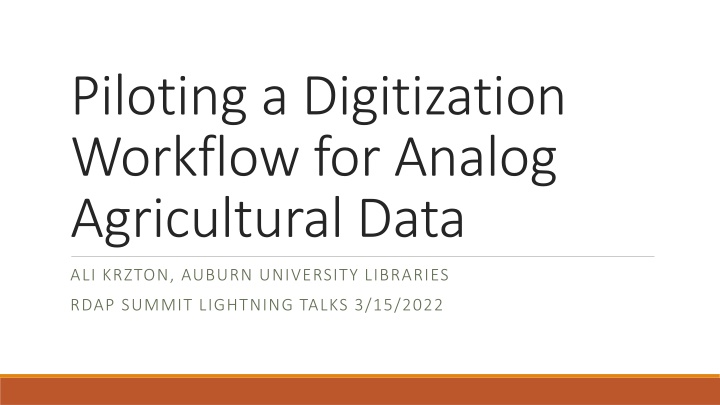
Addressing Backlog of Analog Agricultural Data Through Digitization Workflow
Explore the journey of piloting a digitization workflow for analog agricultural data to address the overwhelming backlog of physical files in major institutions. Learn how efforts are being made to preserve invaluable research through digitization, ensuring data isn't lost with retiring faculty members.
Download Presentation

Please find below an Image/Link to download the presentation.
The content on the website is provided AS IS for your information and personal use only. It may not be sold, licensed, or shared on other websites without obtaining consent from the author. If you encounter any issues during the download, it is possible that the publisher has removed the file from their server.
You are allowed to download the files provided on this website for personal or commercial use, subject to the condition that they are used lawfully. All files are the property of their respective owners.
The content on the website is provided AS IS for your information and personal use only. It may not be sold, licensed, or shared on other websites without obtaining consent from the author.
E N D
Presentation Transcript
Piloting a Digitization Workflow for Analog Agricultural Data ALI KRZTON, AUBURN UNIVERSITY LIBRARIES RDAP SUMMIT LIGHTNING TALKS 3/15/2022
The Problem: Our Cabinets Overfloweth There is a tremendous backlog of data and supporting materials recorded on paper across major institutions This problem is especially acute in agricultural research Faculty retirements increase the pressure to decide the fate of physical files Much irreplaceable data is at risk of loss
The Call: Plan for the Future In 2021, the Department of Entomology and Plant Pathology asked AU Libraries for help with the files of two retired faculty The department needs to develop robust procedures for archiving faculty materials as they retire, especially paper records Ideally, procedures could be standardized within the entire College of Agriculture There is particular interest in making data FAIR
AUs Agriculture Librarian Claudine Jenda(left) and Head of Special Collections and Archives Greg Schmidt (right) assess the collected files containing the work of two professors emeriti in Entomology and Plant Pathology. photo by Ali Krzton
Where Are We Now? The entire collection of paper records for one professor emeritus is now housed within the Libraries Special Collections and Archives Research librarians borrowed one unprocessed box to work on The Agriculture Librarian, Biology Librarian, and Research Data Management Librarian reviewed the files it contained to determine the types of documents and data present A student worker, supervised by the Ag and RDM librarians, identified duplicate information within the files and has begun digitizing the unique items
The Student Perspective I feel honored to assist in the effort of immortalizing research The preservation of these collections through digitization will allow so many opportunities for past work to be implemented in current research. Otherwise, the data from these experiments would collect dust in a cabinet somewhere. The skills required to do this [work] are pattern recognition and basic technology skills, such as using a scanner. [U]tilizing text reading software would be a great development as it would expedite the process. This project has so much potential to flourish into a full-scale digitization. Courtney Stewart, undergraduate student assistant
Whos Doing What? WHO WHAT Department of EPP personnel Identify at-risk data, provide context Special Collections and Archives Assess potential collections, physically transport and house paper records, ingest and process as archival materials Research librarians Find macro-level patterns within the collection, identify scholarly publications related to the data, bring subject knowledge to bear, make data FAIR Student worker(s) Learn the particulars of the collection, find micro-level patterns, digitize documents, enter data manually
What Comes Next? Continue scanning the unique items in the files Enter data tables in a machine-readable format Decide how to make the digitized reports available Repeat the process with the other boxes Generalize procedures to other research collections
Thanks for listening! Questions? Ali Krzton, alk0043@auburn.edu
